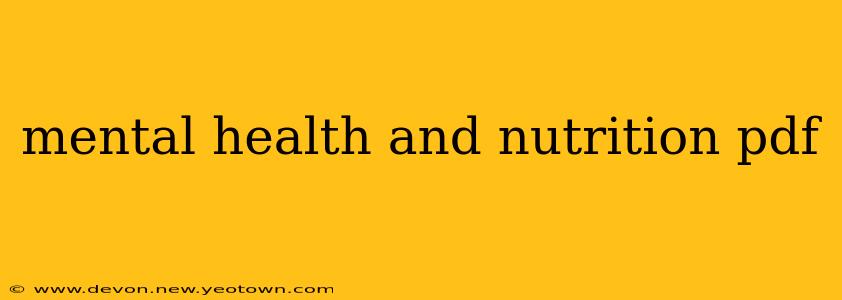The Mind-Body Connection: How Nutrition Impacts Your Mental Health
It's a well-known fact that what we eat profoundly affects our physical health. But did you know that the food we consume plays an equally crucial role in our mental wellbeing? The connection between mental health and nutrition is intricate and powerful, a relationship that's becoming increasingly understood and researched. This isn't about restrictive diets or quick fixes; it's about nourishing your mind and body for sustained mental wellness.
Imagine your brain as a high-performance machine. To run optimally, it needs the right fuel – the essential vitamins, minerals, and nutrients found in a balanced diet. Depriving it of these crucial elements can lead to a decline in cognitive function, mood swings, and even the development or worsening of mental health conditions.
What are the key nutrients that support mental health?
This is a question often asked by those seeking to improve their mental wellbeing through diet. Let's explore some key players:
Omega-3 Fatty Acids: Think of these as the brain's super-lubricant. They are vital components of brain cell membranes and influence the production of neurotransmitters, the chemical messengers that regulate mood, sleep, and other cognitive functions. Good sources include fatty fish (salmon, tuna, mackerel), flaxseeds, and chia seeds.
B Vitamins: This family of vitamins is essential for energy production and brain function. A deficiency can lead to fatigue, irritability, and even depression. Excellent sources are whole grains, leafy greens, eggs, and legumes. Vitamin B12, in particular, is crucial for brain health and is found abundantly in animal products. Vegetarians and vegans should ensure they are getting enough through fortified foods or supplements.
Magnesium: This mineral plays a crucial role in regulating neurotransmitters and reducing stress hormones. Magnesium deficiency is linked to anxiety, insomnia, and depression. Good sources include leafy green vegetables, nuts, seeds, and whole grains.
Zinc: This essential mineral is vital for brain development and function. It plays a role in the synthesis of neurotransmitters and protects against oxidative stress, which can damage brain cells. Sources include oysters, red meat, poultry, and beans.
Probiotics: Our gut is often referred to as our "second brain" due to the strong connection between gut health and brain function. Probiotics, beneficial bacteria found in fermented foods like yogurt and kefir, contribute to a healthy gut microbiome, which can positively impact mood and cognitive function.
H2: How does poor nutrition affect mental health?
Many people wonder how specific nutritional deficiencies manifest in mental health. The impact can be profound and multifaceted:
-
Increased Risk of Depression and Anxiety: Diets lacking in essential nutrients can disrupt the delicate balance of neurochemicals, increasing vulnerability to depression and anxiety disorders.
-
Impaired Cognitive Function: Nutrient deficiencies can lead to difficulty concentrating, memory problems, and reduced mental clarity. This can significantly impact daily life and productivity.
-
Exacerbation of Existing Conditions: For individuals already struggling with mental health conditions, poor nutrition can worsen symptoms and make recovery more challenging.
-
Increased Irritability and Mood Swings: Fluctuations in blood sugar levels, often caused by a diet high in processed foods and refined sugars, can lead to irritability, mood swings, and emotional instability.
-
Sleep Disturbances: A poor diet can disrupt sleep patterns, further impacting mental wellbeing. Insufficient sleep can exacerbate existing mental health conditions.
H2: Can a healthy diet help treat mental illness?
While a healthy diet isn't a standalone cure for mental illness, it's a crucial component of a holistic treatment approach. Nutrition therapy, combined with other therapies such as medication and psychotherapy, can significantly improve symptoms and enhance the overall effectiveness of treatment.
H2: What are some practical steps to improve my diet for better mental health?
It's not about radical changes, but gradual, sustainable improvements. Consider these steps:
-
Focus on whole, unprocessed foods: Prioritize fruits, vegetables, whole grains, lean proteins, and healthy fats.
-
Limit processed foods, sugar, and caffeine: These can negatively impact mood and energy levels.
-
Stay hydrated: Dehydration can affect mood and cognitive function.
-
Eat regular meals: Avoid skipping meals to maintain stable blood sugar levels.
-
Consider a Mediterranean-style diet: This diet is rich in fruits, vegetables, whole grains, and healthy fats, and has been linked to improved mental health outcomes.
H2: Should I take supplements to support my mental health?
While a balanced diet is the best approach, in some cases, supplements may be beneficial, particularly if there's a known deficiency. However, it's crucial to consult with a healthcare professional or registered dietitian before taking any supplements, as they can interact with medications or have other potential side effects. Self-treating can be dangerous.
Conclusion:
The relationship between mental health and nutrition is undeniable. By making informed food choices, you're not just nourishing your body, but also nurturing your mind. A balanced, nutrient-rich diet is a powerful tool in your journey towards optimal mental wellbeing. Remember, consistency is key, and small changes can make a big difference over time. If you are concerned about your mental health, or would like specific advice tailored to your needs, always consult a mental health professional or a registered dietitian.

